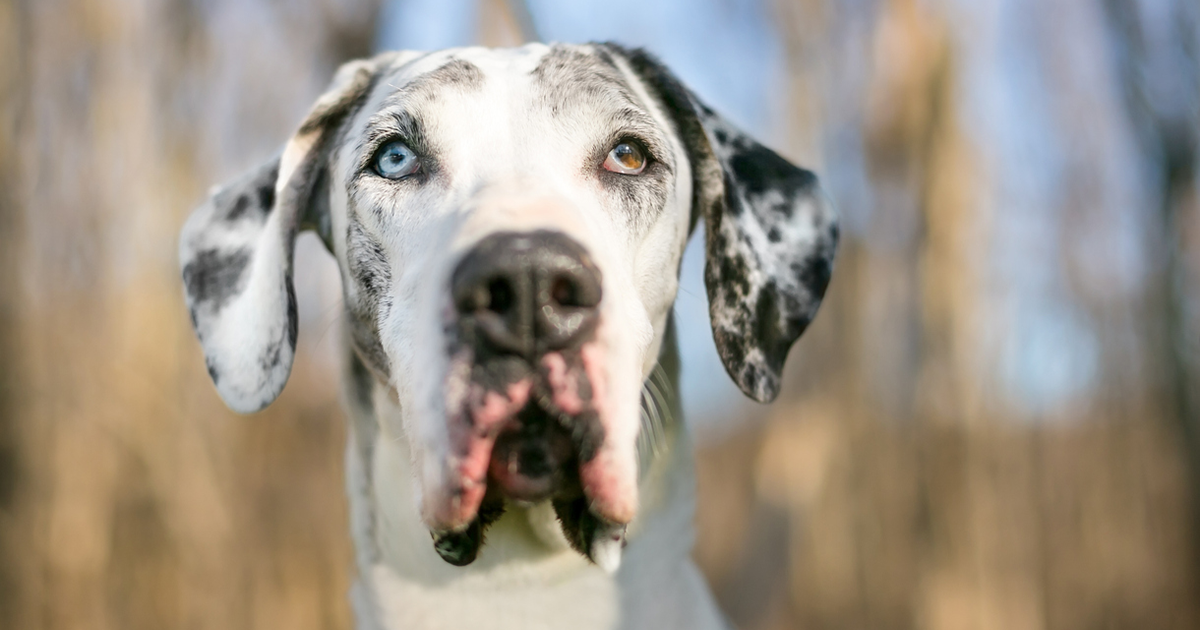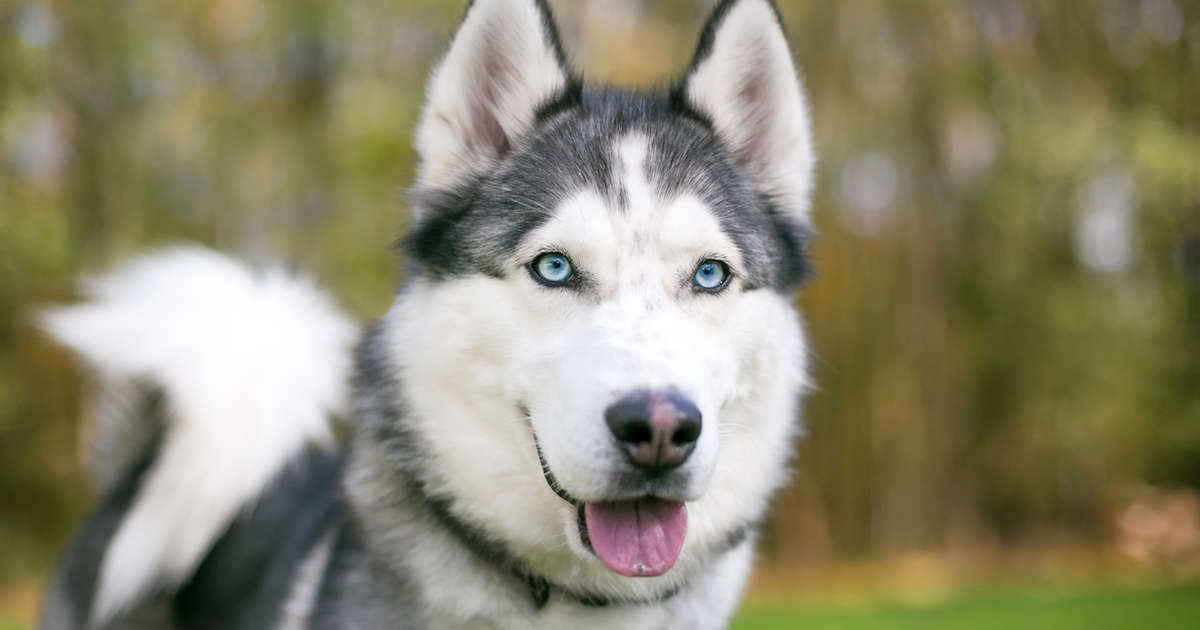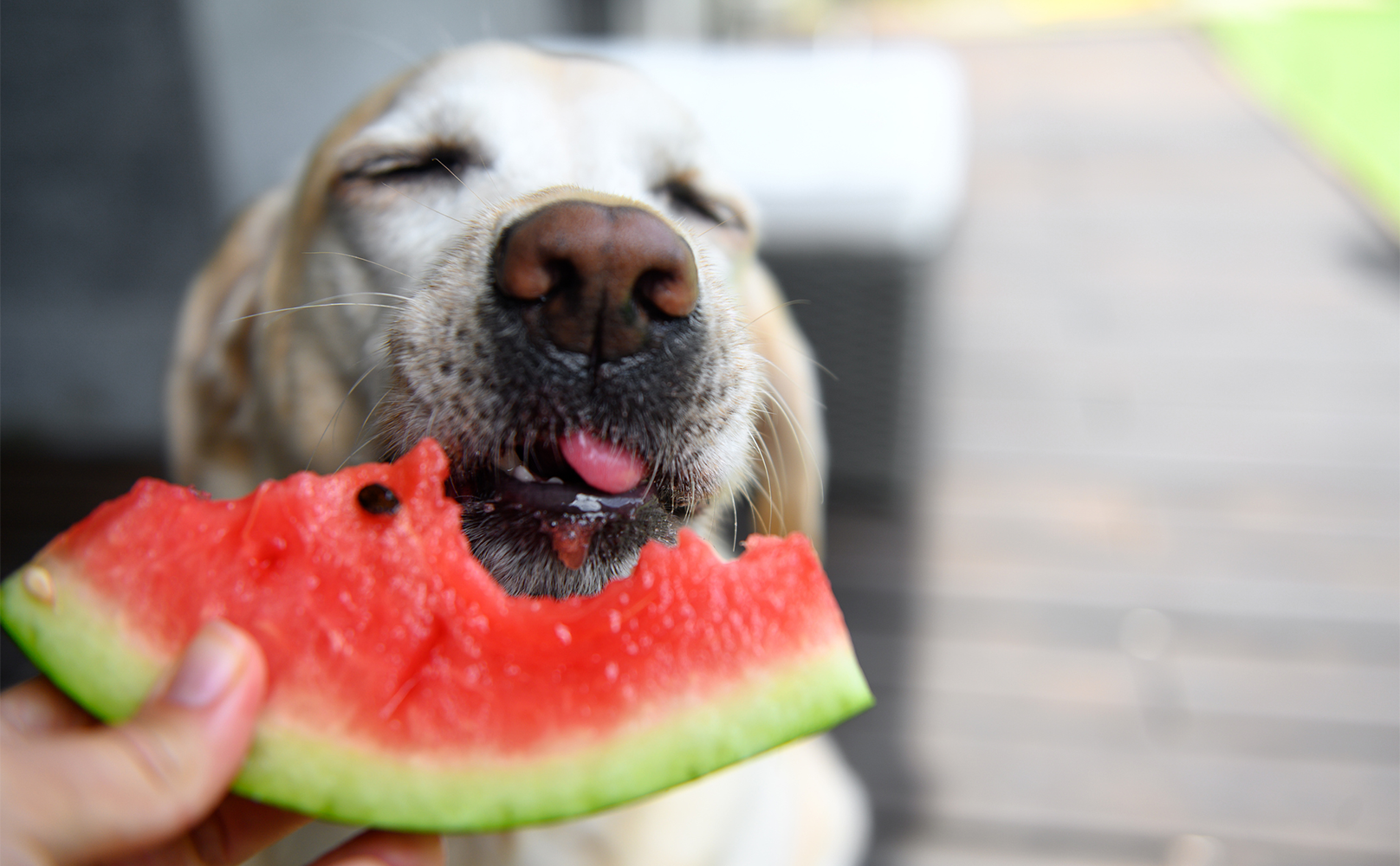Welcome to the BarkPost guide to dog breeds where we belly flop straight into the depths of dog breed origin, evolution, and purpose. Follow along each week as we publish new guides that highlight the strangest, most interesting, and most surprising stuff about these creatures who have been our best buds the last 30,000 years.
Intro / Overview
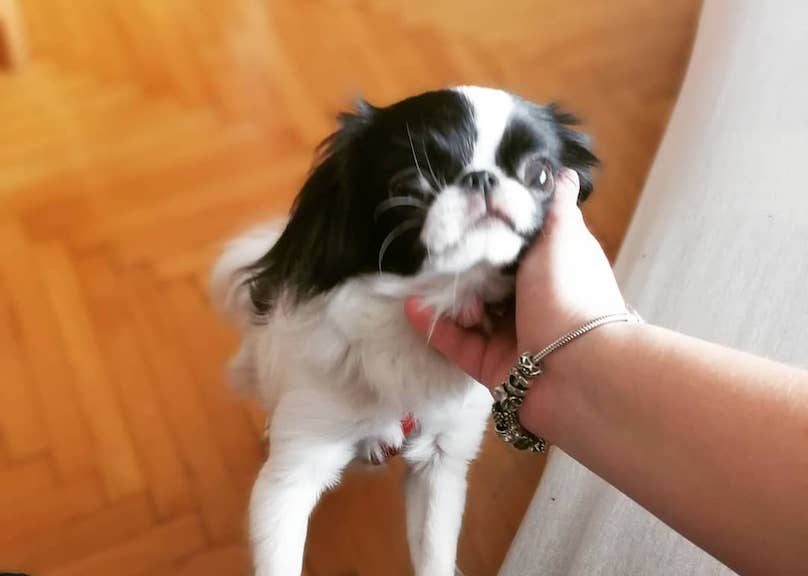

(All dogs are individuals, which means any single dog from any breed can be any number of ways, both good and not so good. Keep that in mind as we discuss breed generalities!)
Presenting their Royal Dogness: the Japanese Chin. Bred to be companion animals only to royal and noble blood within the Japanese aristocracy, these elegant pups know just how to comfort and amuse their humans. These dainty yet playful pups make the perfect lap dog, or partner in crime.
But that’s not all. These pups also share striking similarities to another domesticated pet. Alertness. Intelligence. Independence. That’s right. If you’re a cat person, the Japanese Chin may be the dog for you. However, Chin are also loving, playful, loyal companions, making this toy breed is the best of both worlds (if your worldview is comprised of dogs and cats, that is).
Also Known As…
Chin. Japanese Spaniel. “The dog that most resembles Bob from Twin Peaks.”
Origins
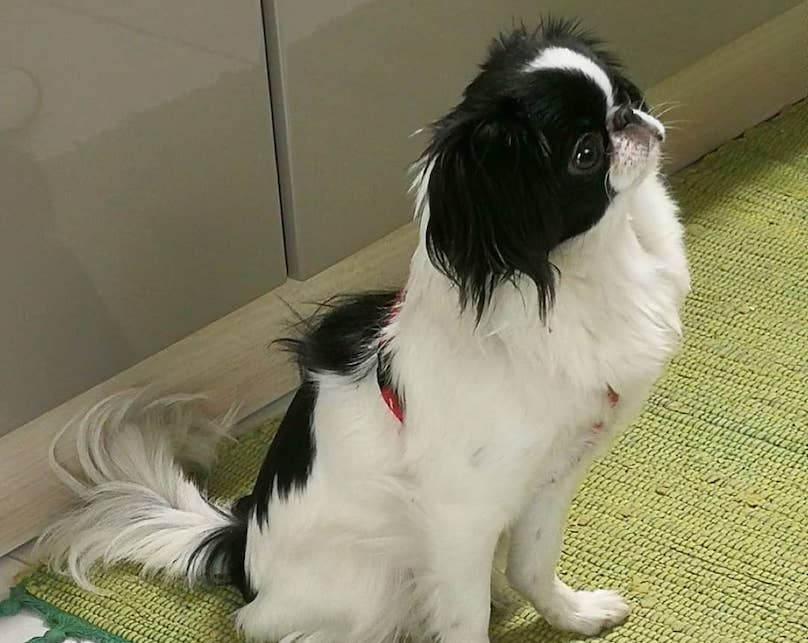

While Japanese nobles are responsible for cultivating the Chin as we know it today, the breed’s introduction to Japan has long been up for debate. Conflicting stories put the Chin origin in the hands of the rulers of Korea, or the Chinese emperors, or Buddhist monks, or European merchants, and anywhere from 500 to 1000 years ago.
However they arrived in Japan, the Japanese Chin, a companion breed, served a unique purpose, as other dogs generally served as worker or helper animals. In 1854, after centuries existing in Japan as “royal’s best friend”, the Japanese Chin was introduced to the West, when Japan was reopened for trade after 200 years of isolation.
Size
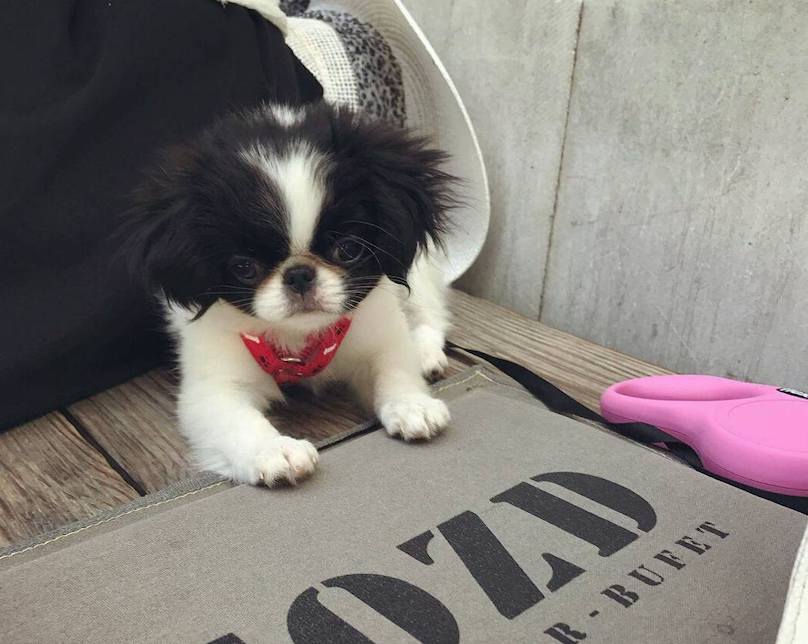

The average height for male and female Japanese Chin is 8 – 11 inches.
Weight Range
The average weight range for Japanese Chin is 4 – 9 pounds.
Personality
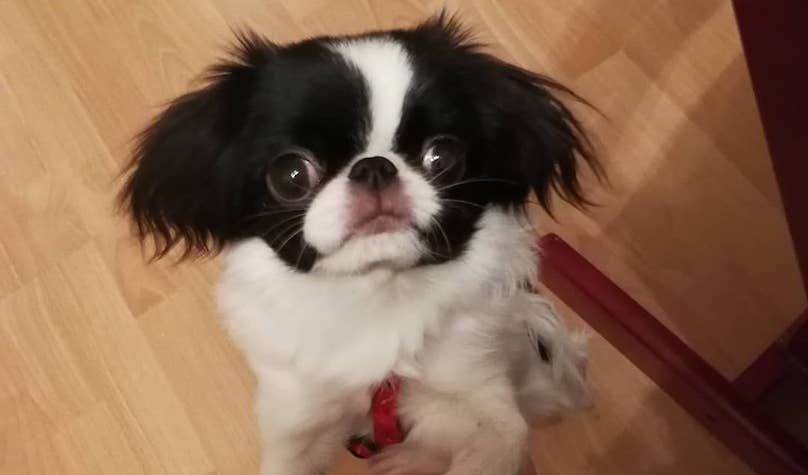

While Chin are known for being elegant, mild-mannered, and even dainty (all true!) there is also a humorous and energetic side to these companion animals whose only job was once to amuse, charm, and comfort royalty. Therefore, these pups not only adapt well to new and different situations, but they are also known to mold their personality to that of the household. A lively and active home will create a more outgoing Chin, while a quiet and somber home will yield a more reserved Chin. Keep in mind, both will still possess wonderful companion qualities.
Intelligence / Trainability
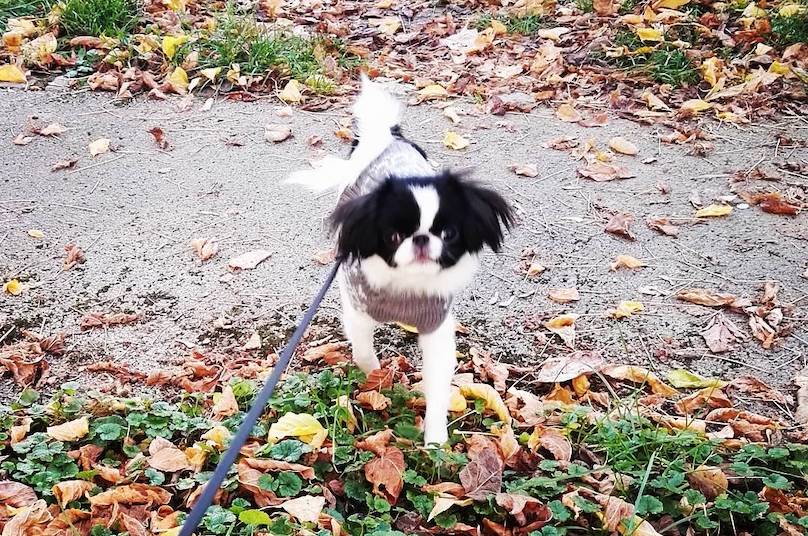

Intelligent and eager to please, Chin can respond well to positive training, yet activities must be varied and entertaining or the pup will lose interest and focus their attention on something else. They do best when they think whatever task they’re completing is their own idea. A Chin’s friendly demeanor also make them an ideal therapy dog.
Ideal Environment
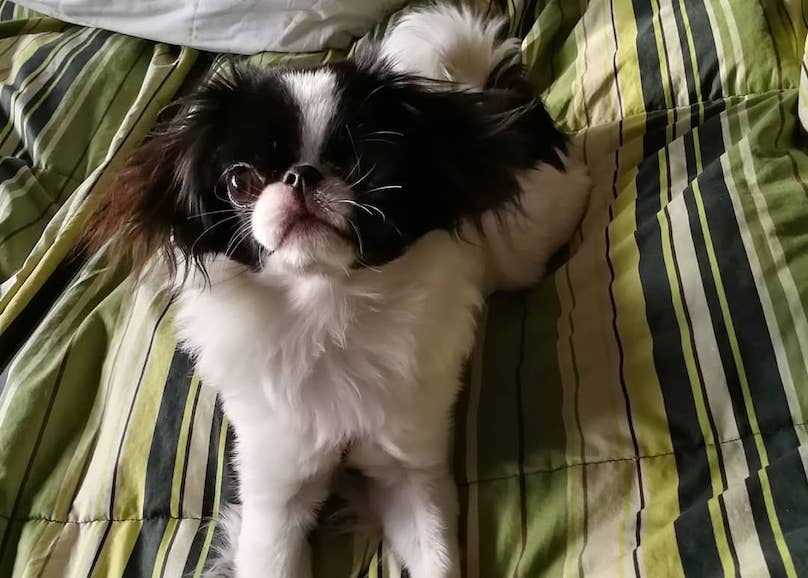

Chin do great in apartments, but also will adapt to any living situation, except life outdoors, since these little pups cannot take extreme temperatures and are companion dogs who want to be around their families. Though not overly-energetic, they can certainly make use of a fenced yard. When outside of secure areas, always keep your Chin on a leash as they have a tendency to selectively focus.
Good For Families And Kids?
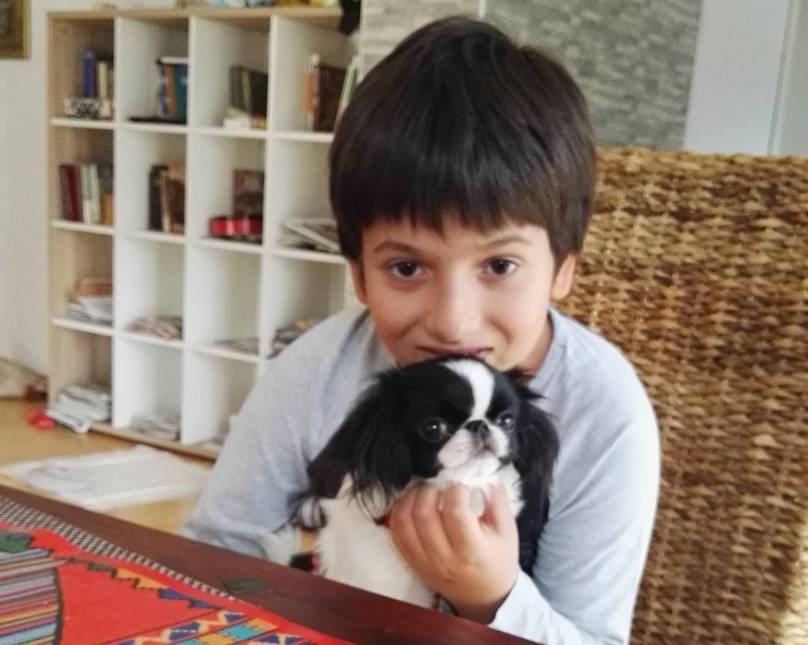

These affectionate and loyal dogs are wonderful companions for the whole family, and will be happiest when they are involved in the fun. These playful pups are great for older children. Due to their small size, it is best to keep Chin away from younger children to avoid the pup getting accidentally injured in play.
Average Lifespan
The average life expectancy for Japanese Chin is 12 – 14 years.
Health
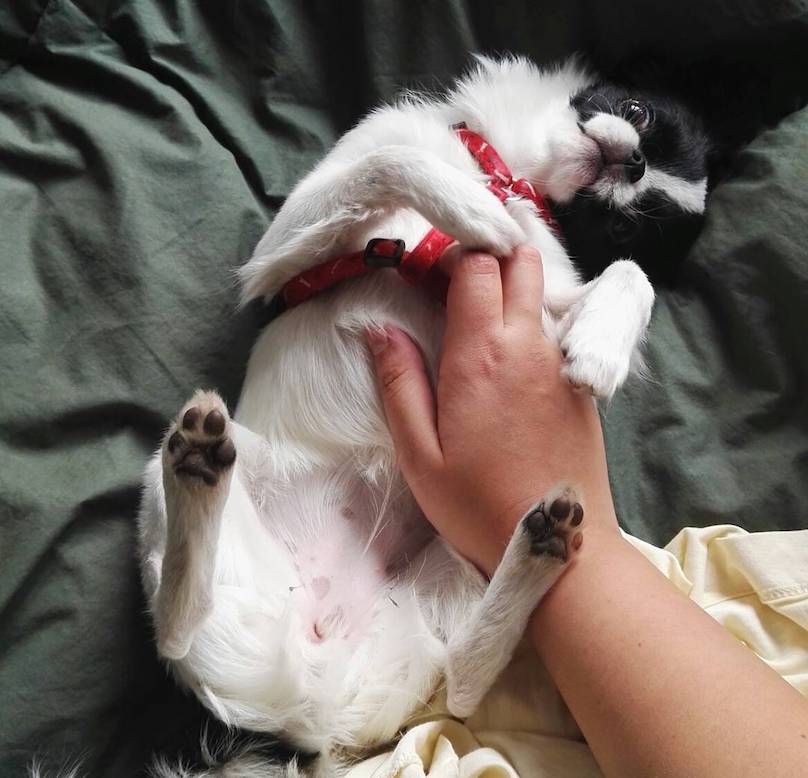

Chin are generally healthy dogs, however, like all breeds, there are some more common health issues to be aware of and discuss with your veterinarian, including luxating patellas (slipping kneecaps), cataracts, epilepsy, and early-onset heart murmurs.
Energy
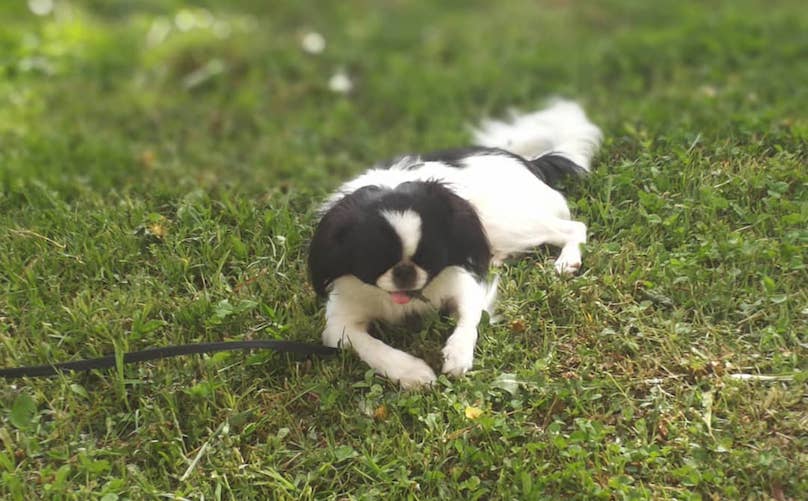

Chin are playful yet low energy and require little in the way of exercise. A daily walk is always appreciated, but will not lead to destructive or unwanted behaviors if missed. If you want to lay around, a Chin is happy to lay around with you. And if the mood should strike for a romp in the yard, your Chin is up for that, too. The important thing is that they’re fulfilling their role as your companion.
Friendly With… (Dogs? Strangers? Cats/Other Pets?)
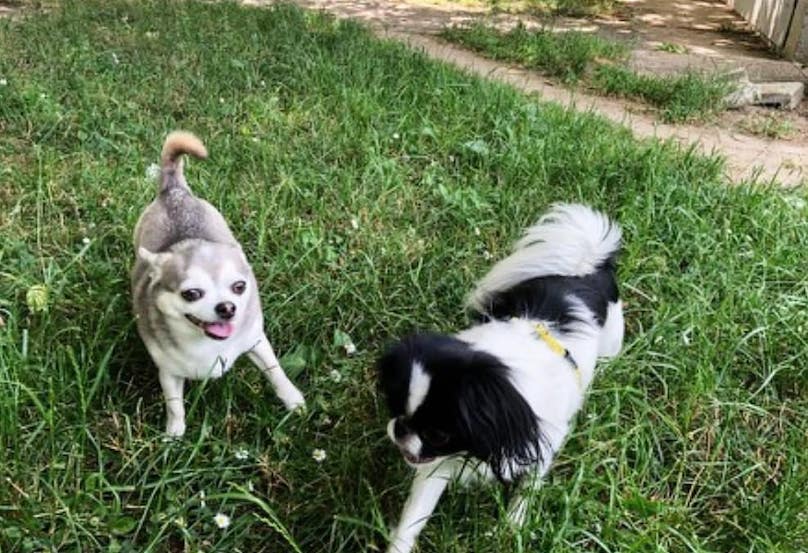

The Chin is a dog’s dog as well as, um, a cat’s dog, meaning they get along well with other dogs and cats, although caution must be taken with larger dogs who could accidentally injure the smaller pup. Also, a Chin’s large eyes are a vulnerable target to cat claws so friendly fire is a must. While naturally shy among strangers, or newcomers until they get to know them, this shyness is manifested in aloofness rather than aggression, and should dissipate once they get to know the “new human.”
Coat & Grooming
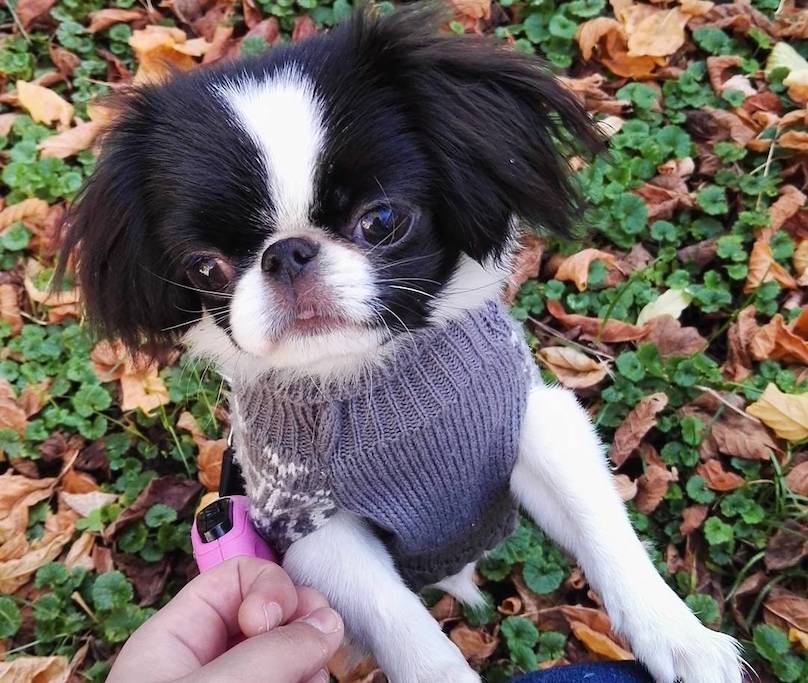

Stylish, though perhaps a bit under-dressed, Chin have only a silky overcoat (no undercoat), which can take up to two years to fully grow in. Colors comprise of black and white, red and white, or a combination of all three. As fancy as it may appear, with feathering on the ears and legs, this moderately long coat only needs a weekly brushing to help with shedding, and a quick daily brushing with a pin brush to avoid tangling.
A weekly checking of the ears for any redness or bad odor, along with keeping their nails trim and brushing their teeth 2 –3 times a week, will go a long way to keeping larger health issues at bay.
Quirks
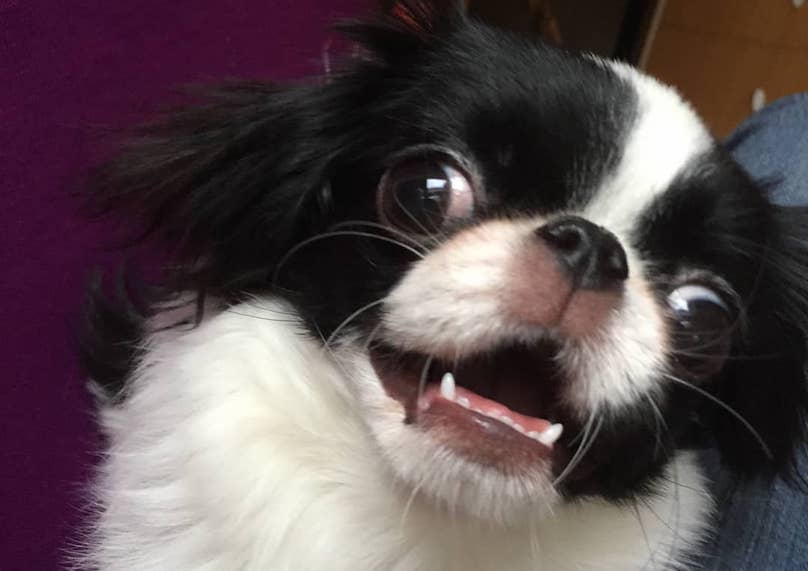

Their cat-like nature not only includes wanting to perch on high places, but also climbing or leaping to those very spots. They’ve also been known to clean themselves and bat objects.
Toys Japanese Chin Would Like Best
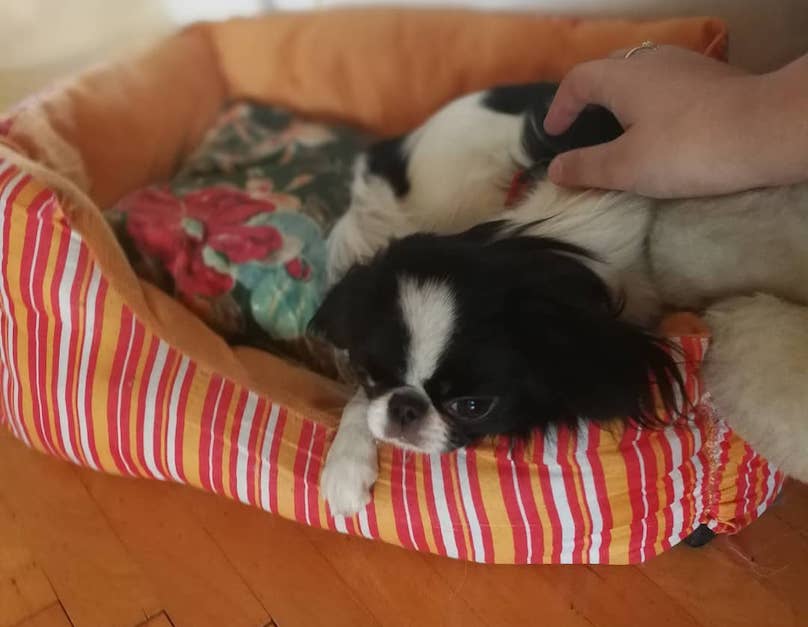

While a cat-teaser may not be the worst toy to have on hand for a Chin, these playful pups do well with all kinds of toys, such as plush toys, tug toys, or even tough toys! Just keep in mind that due to their small size, rough play should always be avoided.
If you’re looking for size-appropriate toys for your Chin, check out our “What Are The Best Toys For Small Dogs?” post for more insight. And then, take a look at our “What Are The Best Fetch Toys For Small Dogs?” post for recommendations of outdoor fun.
Recommended Diet Or Supplements
Feeding your Japanese Chin (or any dog) the freshest whole food diet you can afford (trying to eliminate fillers, grains, or inflammatory proteins such as chicken), can go a long way to decrease health issues and increase longevity.
Coconut oil can also help to prevent inflammation, and can help protect the nervous system, while locally-sourced, season-appropriate honey can help with allergies.
Fish Oil Skin & Coat Supplement
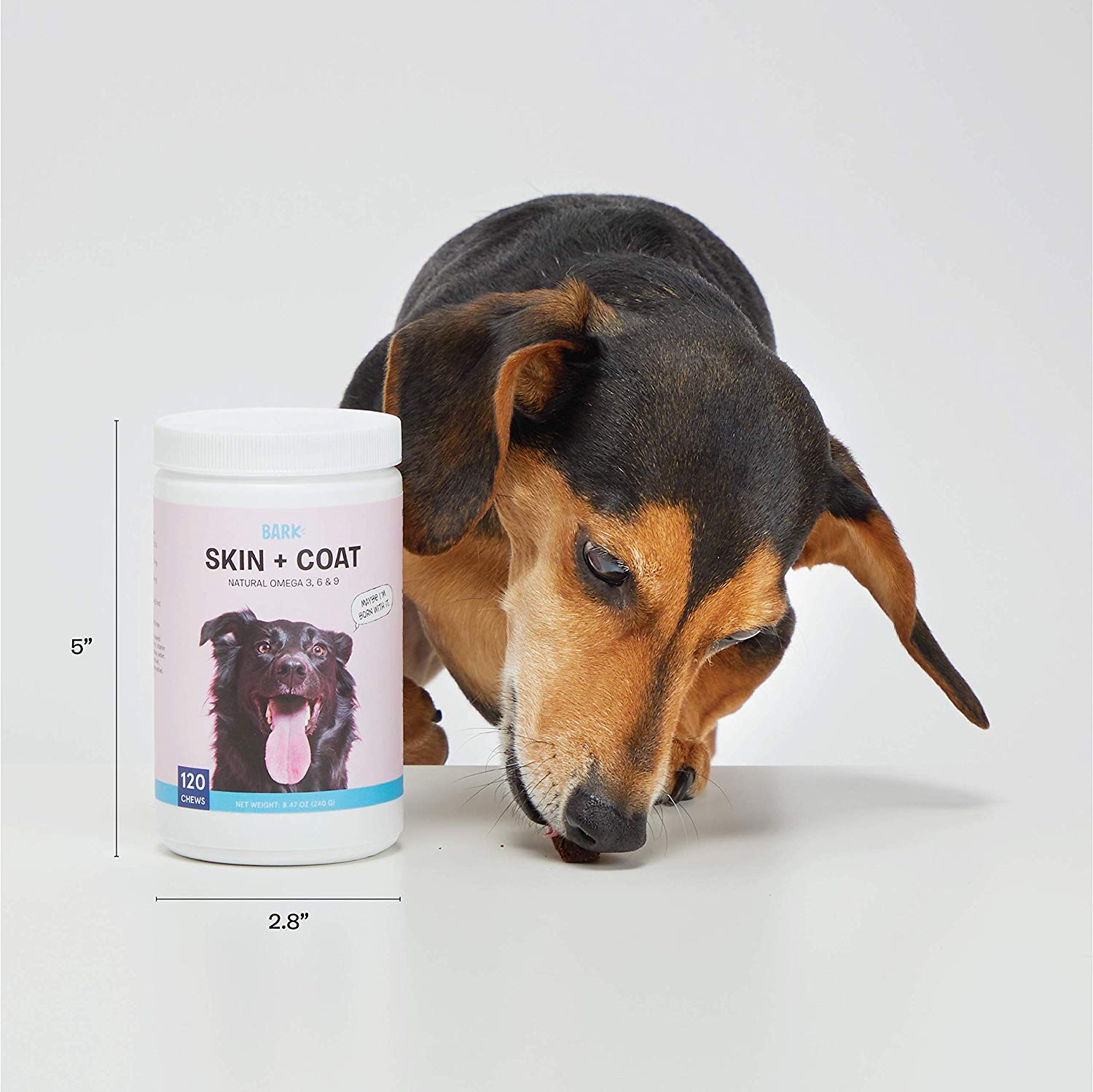

These delicious, vet-formulated chews are made with all-natural ingredients including Omega 3, 6, 9, and Vitamin E. They are designed to support immune health, provide relief from itchy allergic skin, and promote a healthy coat. ($19.99)
Full-Spectrum Hemp Oil
BARK’s Full Spectrum Hemp Oil is made of organically grown whole plants, grown in Colorado, and is non-psychoactive. It comes in 100mg, 250mg, and 500mg varieties, and can help with pet anxiety and pain relief. ($17.99-22.99.)
Recommended Products
Orthopedic Ultra Plush Memory Foam Dog Bed
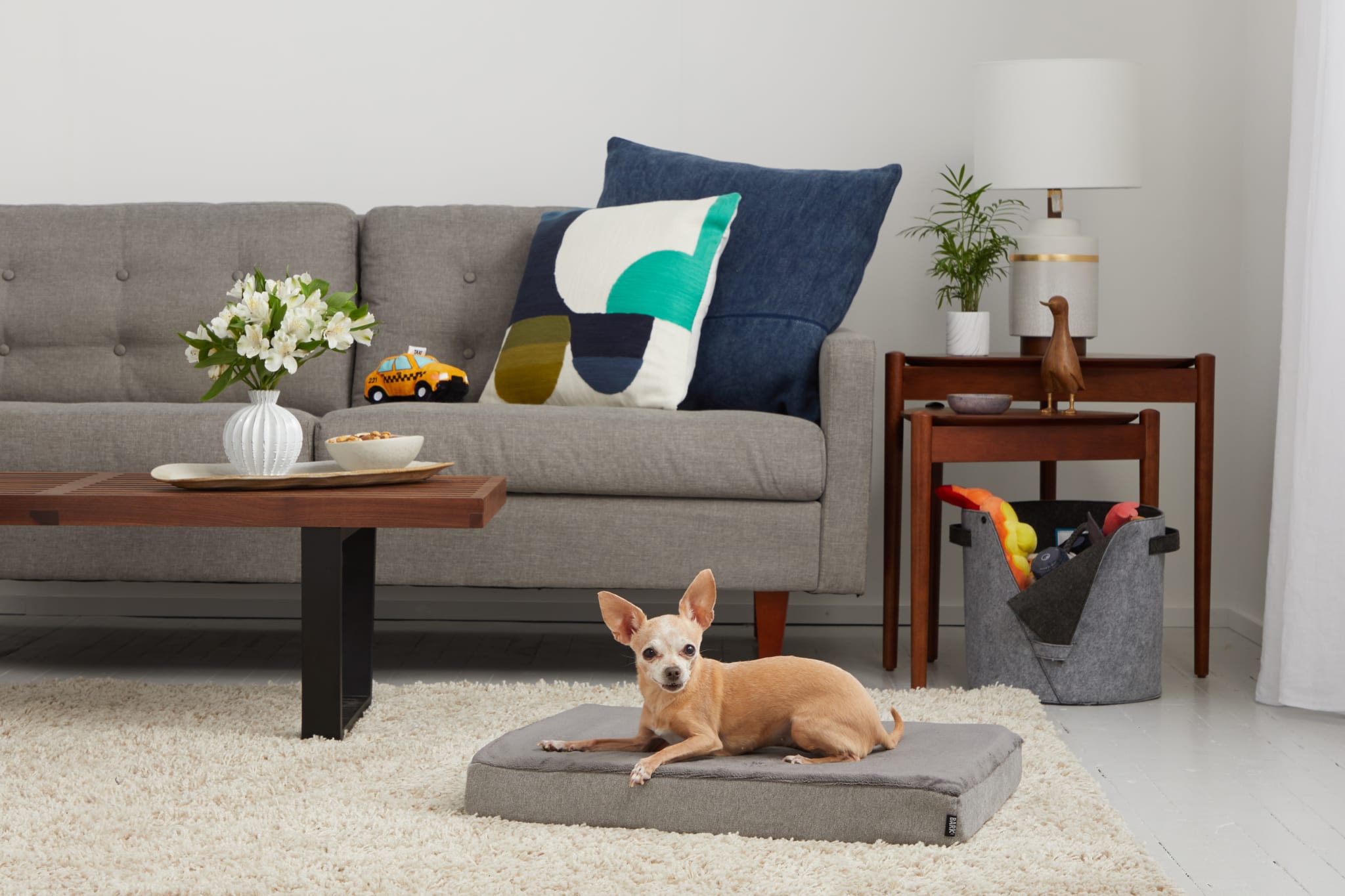

This ultra plush orthopedic dog bed provides support for even the most spoiled of Japanese Chins! The combination ergonomic memory foam and gel foam relieves pressure points, and helps ease body aches caused by hip dysplasia, arthritis and other orthopedic issues. It offers the best therapeutic support for your Chin. ($27.99-64.99.)
Notable Rescues To Find The Japanese Chin Of Your Dreams
- Japanese Chin Care and Rescue Effort (JCCARE) is a non-profit organization comprised of all volunteers dedicated to the health and welfare or Japanese Chin dogs. Their purpose is to help, rehabilitate and find homes for abused, abandoned, or relinquished Japanese Chin across the U.S. and part of Canada.
- Colorado Japanese Chin Rescue is a group of unpaid volunteers dedicated to rehabilitating and re-homing Japanese Chin. All dogs are kept in the group’s rescue homes and treated like members of the family until a new special home can be found.
- Luv A Chin Rescue is a small, non-profit rescue group made up of a nationwide reach of volunteers and foster homes. This rescue does also place other breeds in need from time to time.
- Adoptable Chins on Petfinder
Notable Instagram Japanese Chin
@sovicathechin
Sovica is cute, very small, and very energetic. His name means “little owl.”
@lunajapaneseechin
This “Little Princess” knows how to make a big splash! Luna is almost 4 years old and living the good life in Valjevo, Serbia. Whether walking in a creek or chllin’ in the sun, this pup will add some fun to your daily feed.
Follow this little Chin in a big world, as he gets into mischief (and snuggle sessions!) with his Boston Terrier brother. Oh, and there’s also the cats…
Sulu loves peanut butter, sunbathing, hiking, people, cats, and other dogs he can hump. He hates baths, vacuums, and hula hoops. We think Sulu and your Instagram feed are a match!


***Looking for a gift to blow your Chin’s mind? Spoil them with BarkBox! Every month BarkBox delivers 2 original toys, designed in-house, 2 full bags of all-natural treats, and a chew. Sign up here and receive a free extra toy every month. <– This deal is worth up to $120 in value if you sign up for a 12-month subscription! 🙂
Featured image via Sovicathechin/Instagram
Want More Breed Guides Like This?
Japanese Spitz Breed Information Guide
Shih Tzu Breed Information Guide


